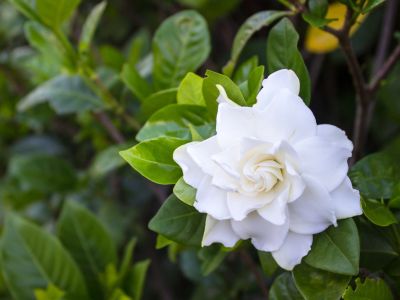Taking Care of Gardenia & Growing Gardenia Plants
Gardenias require bright, indirect light. They also need moist, well-drained, acidic soil for optimal growth. Gardenias also thrive in humid conditions, so when growing gardenia plants, use pebble trays or humidifiers to add moisture to the air. Gardenias prefer warmer days and cooler nights as well.
Fertilizing Gardenias
An important part of taking care of gardenia plants is to give them fertilizer. Gardenias should be fertilized in spring and summer. Fertilizing gardenias in fall or during winter dormancy should be avoided. In order to prevent over fertilization from occurring, you should apply fertilizer about once a month. Mix fertilizer directly into the soil or add to water and apply to the soil. Using less than the recommended amount will also help minimize the likelihood of burning plants by over fertilizing. Whether using powder, pellet, or liquid fertilizer, gardenias require a type specifically designed for acid-loving plants. Those with additional iron or copper, which enhances leaf and flower development on growing gardenia plants, are good choices as well.
Homemade Gardenia Fertilizer
As an alternative to using pricey commercial type fertilizer, gardenias benefit from homemade fertilizer as well. These are just as effective. In addition to amending the soil with compost or aged manure, these acid-loving plants will appreciate coffee grounds, tea bags, wood ashes, or Epsom salts mixed into the soil as well. Since they are rich in nitrogen, magnesium, and potassium, coffee grounds are oftentimes a more favorable homemade gardenia fertilizer. Coffee grounds are also very acidic in nature. Of course, watering the soil around plants with a white vinegar and water solution (1 tablespoon of white vinegar to 1 gallon of water) can also increase soil acidity.
